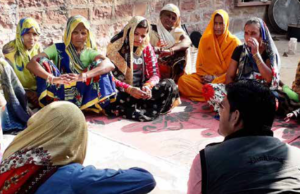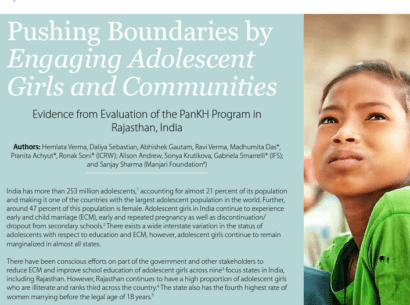
Promoting Adolescents’ Engagement, Knowledge, and Health (PAnKH)
2015 - 2018
MacArthur Foundation, Child Investment Fund Foundation (CIFF) and Pentland
Pranita Achyut, Untitled, Dr. Madhumita Das

Promoting Adolescents’ Engagement, Knowledge, and Health (PAnKH) is an integrated community-based program aimed at improving outcomes related to marriage, educational attainment and sexual and reproductive health for adolescent girls. The program was implemented in select villages of the Dholpur district of Rajasthan by the International Center for Research on Women (ICRW), along with its implementation partner Professional Assistance for Development Action (PRADAN), and technical partners the Institute for Fiscal Studies (IFS) and International Inspiration (IN). PAnKH also received support from the MacArthur Foundation, Child Investment Fund Foundation (CIFF) and Pentland.
Based on a socio-ecological approach, the program included adolescent girls, parents, boys, village-level mentors, community leaders, ASHA and Anganwadi workers and other stakeholders to create an environment to support girls and their aspirations.
WHAT DID WE SET OUT TO DO?
- In Rajasthan, PAnKH aimed to develop an integrated model to engage unmarried and married adolescent girls between the ages of 12 and 19, their parents, communities, schools, health systems and other key stakeholders.
- Test the effectiveness of the ‘integrated intervention model’ in improving Sexual and Reproductive Health (SRH) of adolescent girls compared to ‘girls’ only intervention’ and standard government initiative(s).
- Support research uptake and policy advocacy to strengthen ongoing adolescent SRH programs.
- In particular, the program aimed at enhancing community support to retain girls in schools and promote higher education through delayed marriages and prevention of violence against women and girls (VAWG).
EVALUATION
Intervention was evaluated using a three-arm randomized control design and mixed methods of data collection with 30 clusters in each arm. The 60 clusters, villages or groups of nearby villages were spread over three blocks of the Dholpur district – Bari, Baseri and Dholpur.
Study Models
- Model I: ‘Girls only intervention’ includes girls aged 12-19 years, unmarried and married.
- Model II: ‘Integrated intervention’ includes girls aged 12-19 years, unmarried and married; men and boys aged 15-24 years; parents/caregivers of all selected girls; community stakeholders; and health providers.
- Model III: ‘Control group’ with no intervention component, except the regular government program intervention, if any.
These study models evaluated the comparative effectiveness of the ‘integrated model’ vis-à-vis ‘girls’ intervention on outcomes related to attitude toward gender norms, safety at home and in public spaces, age at marriage, school retention, agency, life skills and SRH of adolescent girls.
KEY FINDINGS
- Girls in both intervention arms were significantly more likely to be attending school at the endline than girls in the control group.
- There is suggestive evidence that PAnKH had an impact on marriage rates among older girls, aged 15-17 at baseline.
- The education and marriage effects set in at the ages when girls in the control group experienced the sharpest decline in school attendance and rise in marriage.
- Results of mediation analysis suggest that delays in marriage in the treatment group are explained by girls staying at school longer.
- Adolescent girls experienced significant improvements in their mental health and a reduction in the tendency to victim-blaming for the experience of violence when the programme targeted the wider community environment in addition to the activities with the girls themselves.
LEARNINGS
Taken together, the experience of implementing the PAnKH programmes, the quantitative evaluation, the qualitative evaluation, and the cost-effectiveness analysis suggest that community-based interventions that focus on life skills, attitudes and mental health may be a promising model for policy seeking to improve the education and welfare of adolescent girls.

